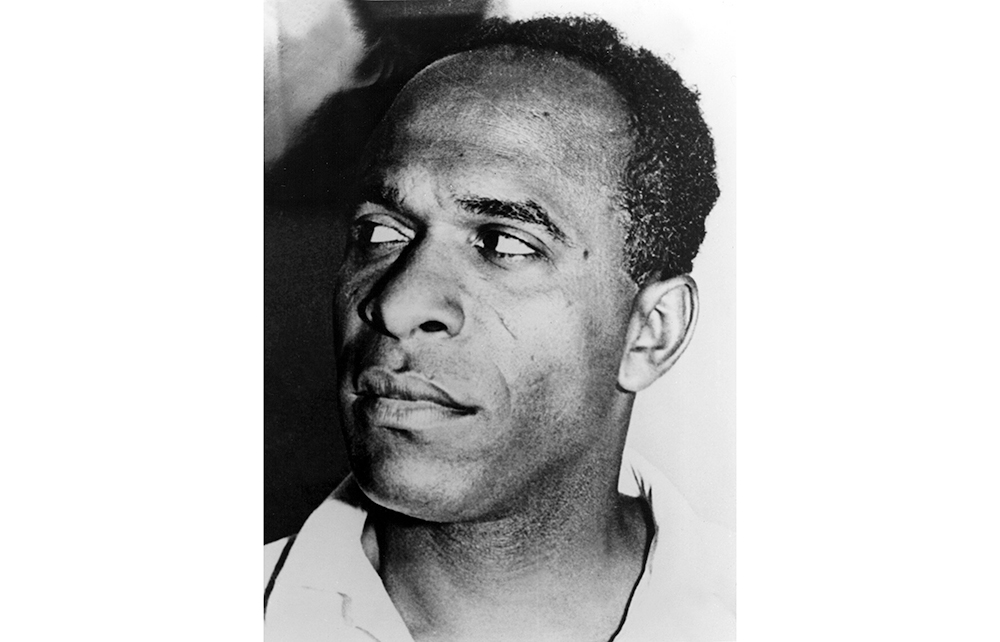‘If I’d died in my thirties, what would be left behind?’ is the question that keeps coming to mind reading this timely new biography of Frantz Fanon, the psychiatrist and philosopher who became an icon to leftist revolutionaries across the globe. ‘Would I want history to judge me by what I wrote at 36?’ For that was the absurdly young age at which Fanon died of leukaemia in 1961, leaving two key works to his name: Black Skin, White Masks and The Wretched of the Earth. Not a huge legacy, then, in sheer numbers of words.
But it was enough to seal his reputation as both a chronicler of one of the 20th century’s most important independence movements and a thinker whose examination of the damage done by colonial racism influenced decades of activists, from Che Guevara in Cuba to Steve Biko in South Africa and the Black Panthers in the US. His star did not burn long, but it burned bright.
Before he died, Fanon was becoming the rallying voice for anti-colonial movements across the developing world
The Black Lives Matter movement makes his ideas more topical than ever, so it is strangely jarring to be reminded that Fanon’s own reference points were Freud and Hegel, and that Jean-Paul Sartre and Simone de Beauvoir were the contemporaries he met and sought to impress. Theirs feel like voices from another era; he seems a man of our time.
Fanon made up for his short lifespan by trying out new roles at breakneck speed. Within a few years of leaving his native Martinique to fight Nazi Germany – a loyal young Frenchman inspired by Republican values – he was registering the impact of systemic racism at medical school in Lyon and psychiatric clinics in southern France and French-occupied Algeria. That understanding fed his decision to embrace the FLN liberation movement as his own.
Fanon shared neither the FLN members’ skin colour, language nor religious faith, but that didn’t stop him becoming the movement’s healer and trusted spokesman. Before he died, he was already moving on to a bigger stage, becoming a rallying voice for anti-colonial movements across the developing world.
Fittingly captured in this vividly written, though unabashedly erudite account, it’s an extraordinary itinerary. Yet one finds oneself wondering: had Fanon lived another 20 years, would he have come to regard the opinions expressed in his books as those of an impetuous youngster embarrassingly short of grassroots experience?
While Sartre’s preface to The Wretched of the Earth caricatured Fanon’s views – it comes across today as the posturing of an ageing armchair warrior – the younger man certainly saw violence as a prerequisite for freedom, a ‘detoxifying’ experience which not only released the slave from his inferiority complex but possessed a cohesive effect, allowing the group to rise above regionalism and tribalism.
That claim rings a little hollow to an audience numbed by reports from the ruins of Ukraine and Gaza, the killing fields of Sudan and the Democratic Republic of Congo. Current brutality surely teaches us that however invigorating violence may feel to the individual, it creates grievances which can fester for centuries, laying the groundwork for revenge-taking and a whole new set of grudges. Old men and women – the people who sign peace deals with hardened killers in conference rooms – know this. Fanon did not have time to learn.
For a man praised for the audacity of his thought, Fanon could be surprisingly cowardly, too. Whatever he confessed to friends, in public he discreetly skipped over the FLN’s assassination of his friend Abane Ramdane, a hardline leader strangled in 1957. When the FLN slaughtered 300 villagers thought to support a rival faction, Fanon blamed it on the French, despite knowing better.
While clearly charmed by his protagonist, Adam Shatz nonetheless scrupulously acknowledges the faults of a man who was a little too fond of the sound of his own voice and – more understandably – probably too worried about his own survival to be entirely honest.
Algeria’s post-independence years swiftly exposed how thoroughly Fanon had underestimated the strength of cultural conservatism, ethnic solidarity and religious belief in his adopted nation. ‘It is unlikely that Fanon, if he had been cured of his leukaemia, would have found a home there for long,’ writes Shatz. In 1963, observing Ramadan was made obligatory and Algerian nationality was restricted to citizens of Muslim origin. Most of Fanon’s friends decided it was time to leave.
Today, that disappointment extends far beyond the Maghreb. In his last and most thought-provoking chapter, Shatz wonders what Fanon would have made of today’s world. Whether it’s the increasingly sectarian, misogynistic nature of Narendra Modi’s India, China’s treatment of its Uighur and Tibetan minorities or the use to which Russia puts its atrocity-prone mercenary Wagner Group, ‘Fanon’s project for the post-colonial world lies in ruins’. Shatz writes:
We live in an era in which the neoliberal economic model and democracy governance have fallen into crisis, but in which alternative horizons have also receded from view. Today’s radical movements and insurgencies are religious, identitarian, or both, and many of them are on the hard right.
A born iconoclast, Fanon, one suspects, would have thoroughly revised – rather than nuanced – his early opinions and recommendations as he aged. As it was, he died in a hospital in Bethesda, Maryland, after a medical evacuation – organised, ironically, by the CIA. The world is the poorer for the loss of that fresh, forceful voice.






Comments